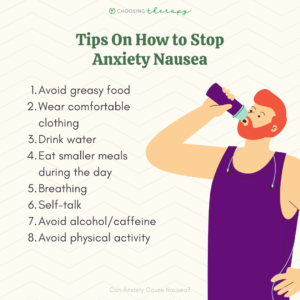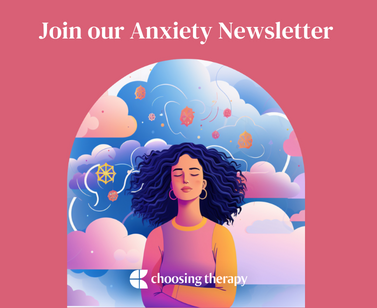Physical symptoms of anxiety include sweaty hands, heat rashes on the face or body, rapid heartbeat, and nausea that ranges in severity from “butterflies in your stomach” to vomiting and dry heaving. These nausea-related symptoms, a result of how the brain and gastrointestinal system work together, often leave a person feeling exhausted.
Find a supportive therapist who can help with anxiety.
BetterHelp has over 20,000 licensed therapists who provide convenient and affordable online therapy. BetterHelp starts at $65 per week. Take a Free Online Assessment and get matched with the right therapist for you.
What Is Anxiety Nausea?
Nausea is a potential symptom of anxiety that can be mild or intense, depending on the situation and the individual.1 It may last for minutes, or it might last for hours or days. However long it lasts, depending on severity, anxiety nausea can leave a person physically and emotionally exhausted.
Why Does Anxiety Cause Nausea?
Anxiety is a bodily response to a perceived threat; it prepares the person for fight or flight.2 One part of the central nervous system, the enteric system, serves the gastrointestinal (GI) tract. The gastrointestinal system is closely linked to the brain and this connection is known as the gut-brain axis. When someone’s stressed, hormones and neurotransmitters both in the brain and in the gut, are released that can negatively affect the way the intestines work, causing GI discomfort.3
How does a person know if their nausea is from anxiety or something else? One question to ask is, “Am I worried about something?” Worrying is a common symptom of anxiety that can cause nausea. Question whether you feel threatened or in danger. Are you being vulnerable? In these situations, anxiety could be the cause of nausea.
Unlike an upset stomach, anxiety nausea usually only lasts until the perceived threat is gone. If nausea is because of something like the flu, other symptoms such as body aches and fever will usually accompany it.
8 Tips On How to Stop Anxiety Nausea
While anxiety nausea is common, it does not have to be a continuous issue; there are ways to at least reduce its effect on the body. The most important thing to do is to recognize when anxiety is the underlying issue for your nausea.
Eight ways to prevent anxiety-induced nausea are:
- Avoid greasy food: making sure to avoid greasy food before a situation that might cause anxiety will help. Then the central nervous system won’t trigger the gastric tract to want to expel the offending greasy food.
- Wear comfortable clothing: when a person is nervous, the body often feels uncomfortable, and body temperature will rise. Wearing clothing that is loose-fitting and breathable helps keep the body from getting too hot, which can trigger anxiety nausea.
- Drink water: with nausea and vomiting, the body loses liquids. Slowly drinking water can help you stay hydrated so you’re able to keep up your strength.
- Eat smaller meals during the day: eating small meals throughout the day means that there’s not as much food in the stomach to cause upset. This also helps keep sugar levels stable so a person’s energy level is stable, too. If vomiting, it’s best not to eat until you’re done. It’s best to eat dry foods like crackers or dry toast until the stomach has time to settle.
- Breathing: take long deep breaths when feeling nauseated. This calms the anxiety and the central nervous system.
- Self-talk: reassuring yourself that everything will be OK can help calm the anxiety. Remind yourself that the situation can be managed to calm the central nervous system.
- Avoid alcohol/caffeine: when anxious it’s best to avoid alcohol and caffeine, which can increase the heart rate, thereby increasing the anxiety.
- Avoid physical activity: when nauseated, avoid physical activity. While exercise does help decrease anxiety, it only serves to increase existing nausea. Instead, try to find a calm place to relax.
When to Seek Professional Help
If you’re anxious frequently and find yourself becoming nauseous more often than not, it is important to seek help. A therapist can help you identify techniques to decrease your anxiety and improve your wellbeing. Using a free online directory, you can begin the process of finding a therapist by location, expertise, price, etc. Once the therapist is chosen, they can help identify the best form of treatment to employ moving forward.
Therapy for Anxiety
Here are two common types of therapy used to treat anxiety:
- Cognitive behavioral therapy (CBT): this type of therapy helps change unhelpful thinking patterns. The person learns strategies to positively change their reactions to thoughts.
- Psychodynamic therapy: this therapy addresses anxiety through self-reflection and self-examination. It might be useful for long term anxiety resulting from trauma or deep-seated emotional conflict.
Medication for Anxiety
There are several medications on the market today that can help decrease or control anxiety, including anti-anxiety medication and antidepressants.4 Talk to a doctor or psychiatrist about what medication they think will help you most.
Final Thoughts On Anxiety Nausea
Anxiety nausea is more common than you think. While many people suffer from it, it does not have to be debilitating. There are techniques to help control and manage your symptoms until they are gone. There are also professionals who can help you on this journey. If you or someone you know is experiencing anxiety nausea, seek help from a mental health provider.
Additional Resources
To help our readers take the next step in their mental health journey, Choosing Therapy has partnered with leaders in mental health and wellness. Choosing Therapy is compensated for marketing by the companies included below.
Talk Therapy
Online-Therapy.com – Get support and guidance from a licensed therapist. Online-Therapy.com provides 45 minutes weekly video sessions and unlimited text messaging with your therapist for only $64/week. Get Started
Virtual Psychiatry
Hims / Hers If you’re living with anxiety or depression, finding the right medication match may make all the difference. Connect with a licensed healthcare provider in just 12 – 48 hours. Explore FDA-approved treatment options and get free shipping, if prescribed. No insurance required. Get Started
Anxiety Newsletter
A free newsletter from Choosing Therapy for those impacted by anxiety. Get helpful tips and the latest information. Sign Up
Learn Mindfulness, Meditation, & Relaxation Techniques
Mindfulness.com – Change your life by practicing mindfulness. In a few minutes a day, you can start developing mindfulness and meditation skills. Free Trial
Choosing Therapy Directory
You can search for therapists by specialty, experience, insurance, or price, and location. Find a therapist today.
For Further Reading
Online Anxiety Test A few questions from Talkiatry can help you understand your symptoms and give you a recommendation for what to do next. How Does ERP Help With Intrusive Thoughts? Obsessive compulsive disorder (OCD) is a psychiatric condition marked by the presence of obsessive thoughts, images, doubts, or urges, followed by compulsive behaviors or acts aimed at easing the distress caused by the obsession. While the content of the obsessions can take many forms, they are always repetitive, persistent, involuntary, and intrusive, and they often result in a great deal of anxiety for the person experiencing them.








